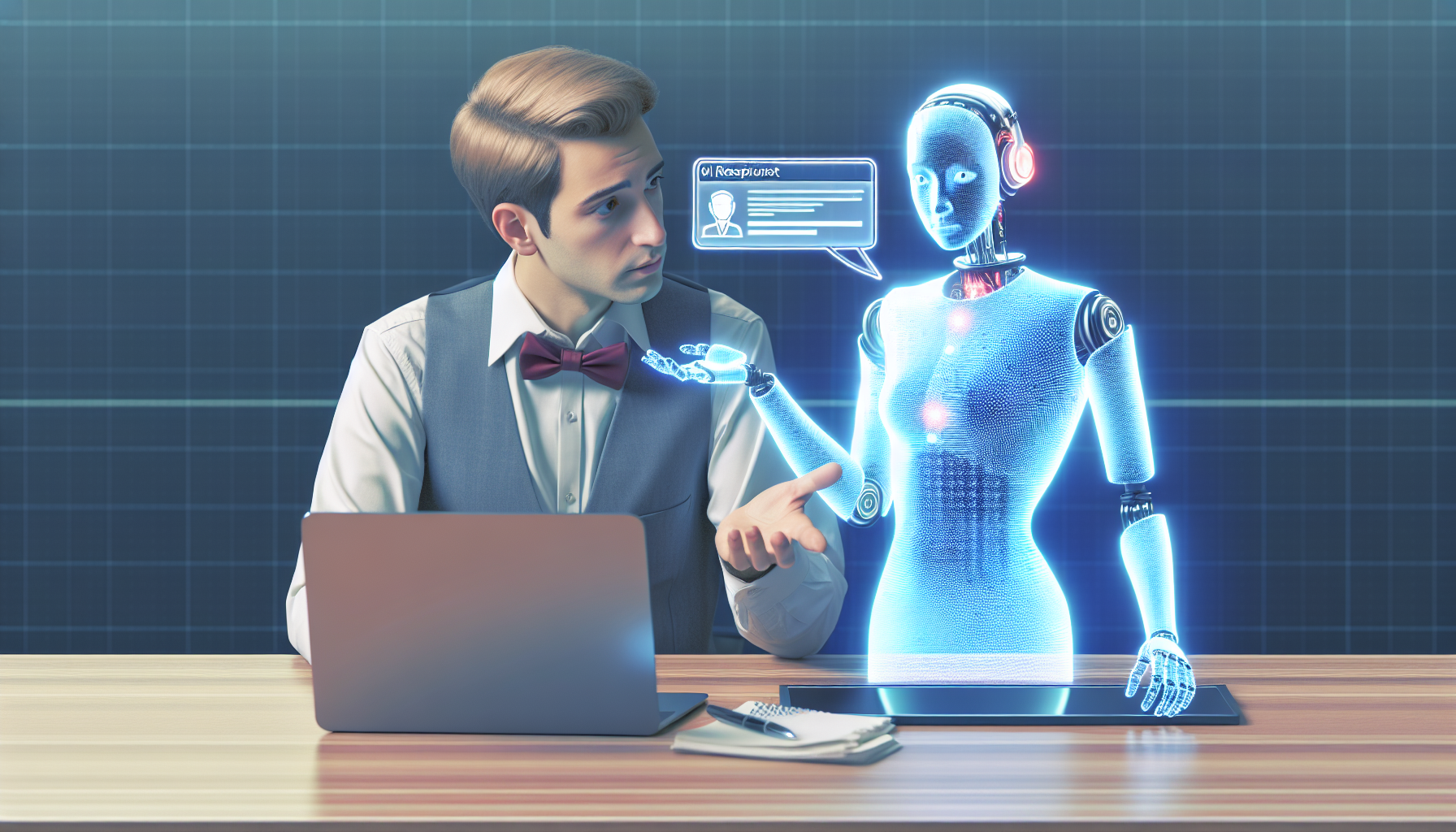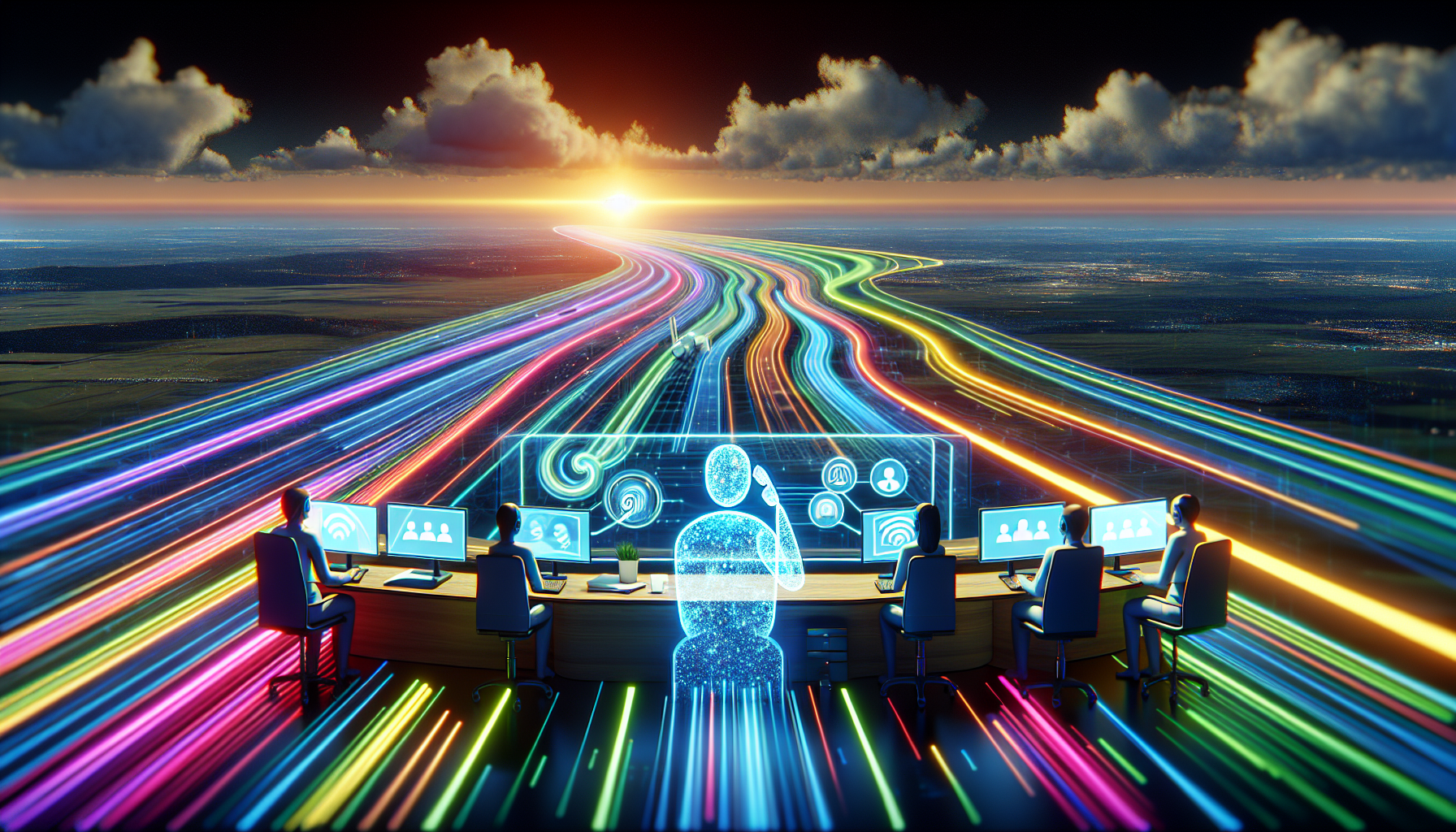
In the fast-paced and dynamic realm of customer service, AI receptionists are reshaping the way businesses handle technical support. In the past, customers dealing with tech issues can remember the frustration of long wait times on hotline numbers, speaking to representatives with varying levels of expertise, and having to repeat their problems again and again. With the advent of Artificial Intelligence, these old problems are being replaced by more efficient, innovative solutions.

Basically, an AI receptionist is a sophisticated AI program that assists with customer service duties, primarily over digital platforms. Rather than having a human answer and direct calls or inquiries, AI receptionists execute these tasks, effectively freeing up human support staff for more complex issues.
They're predominantly employed across swiftly modernizing communication infrastructures in various business sectors, from healthcare to telecommunications. For example, in the IT industry, they're implementing AI receptionists to provide immediate, round-the-clock technical support. Thanks to machine learning and natural language processing, these virtual receptionists can understand and process a vast array of customer service inquiries. They can provide instant support to simple technical problems, arrange callbacks for complex issues, and even foresee potential issues based on data analysis.
The integration of AI receptionists into technical support is a testament to the many ways businesses are becoming more tech-savvy. By reducing wait times and increasing efficiency, they have the potential to significantly improve customer satisfaction and transform the face of technical support in the digital age.
In conclusion, the evolution of AI receptionists demonstrates the extraordinary potential of technology to overhaul traditional practices and set new standards for efficiency and customer satisfaction. With endless possibilities for future improvements, the merging of AI with customer support services is a trend worth watching.
Technological advancements have brought about a significant shift in how businesses operate, with AI-driven services at the forefront. A prime example is AI receptionists, poised to redefine the conventional customer support landscape. They offer enhanced accessibility and reliability, running 24/7 without succumbing to exhaustion, not bound by the limitations of traditional office hours which often lead to bottlenecked service and customer dissatisfaction.
Considering their ability to operate continuously, AI receptionists are efficiently programmed to handle a large number of incoming calls and queries without downtime or delays. This machine efficiency preserves the essence of instant customer support, which traditional human receptionists may find challenging to maintain due to inevitable human constraints such as fatigue and breaks.
Perhaps most crucially, the automation offered by AI receptionists means predictable and consistent performance, eliminating variances in service quality that often occur with different human operators. Customers are therefore assured of a reliable service experience, each time, every time.
Moreover, AI receptionists can also filter and forward calls to the appropriate departments, making support operations smooth and coordinated. According to Intercom, automation can drive up to 40% resolution of simple queries without human intervention. This allows human personnel to focus on the more complex aspects of customer service and enhances overall output.
In conclusion, the sophistication and round-the-clock service of AI receptionists are pushing the frontiers of customer support services. As this MIT Sloan report suggests, businesses that leverage AI in their customer service framework could create a competitive advantage. AI receptionists are undoubtedly solitarily changing the face of technical support.
The technological landscape is rapidly transforming daily operations in numerous industries, with the realm of technical support being no exception. More businesses are leaning towards the utilization of AI Receptionists, fundamentally enhancing their support capabilities. A significant factor driving this shift is the seamless integration possible with a multitude of applications facilitated by Zapier.
With the integration of AI Receptionists with thousands of apps via Zapier, businesses can now automate their workflows, greatly reducing manual entry requirements while elevating efficiency levels. This dynamic interface creates a conducive environment for automated responses that are not only faster but also much more accurate than traditional human-centric models.

Embracing this new technical support model, businesses can provide 27/4 uninterrupted service to their customers. Repetitive tasks can be automated, freeing up human agents to focus on more complex issues. Moreover, implementing AI Receptionists banishes the chances of human error, providing a consistently high level of service efficiency.
Automation also comes with the added advantage of scalability. During high-demand periods, traditionally, businesses must hire more staff or overstretch their existing team. However, with AI Receptionists, the service level remains consistent regardless of demand intensity. The value that such automation brings to a business's customer service department is immense.
Importantly, these intelligent digital assistants continuously learn from their interactions, further improving their service delivery over time. Hence, AI Receptionists do not merely respond to changes but instead drive revolutionary changes in the paradigm of technical support.
Without a doubt, the integration and automation spearheaded by AI Receptionists and powered by tools like Zapier are setting new standards in the world of technical support. By marrying intelligent technology with user-centric service, businesses can create an unparalleled customer experience, propelling them into a more productive and efficient future.
Combining speed, precision, and constancy, AI Receptionists are redefining the landscape of technical support, thanks to their capabilities with scalability and efficiency. Now, businesses of all sizes can sufficiently handle peak call volumes and simultaneous inquiries, providing a consistently high level of service regardless of demand.
Scalability is where AI receptionists truly shine. Traditional human-based support can be overwhelmed during high-traffic periods, leading to long wait times and frustrated customers. However, an AI Receptionist can manage virtually unlimited calls simultaneously. Businesses can easily scale their customer support to suit changing needs, without the burdens of recruiting, training, and retaining additional staff. This automation not only improves response times, but also frees up human staff to handle more complex inquiries, optimizing resources and productivity.
The efficiency of AI receptionists in technical support is also unprecedented. These intelligent systems can diagnose problems quickly by asking a series of targeted questions, fostering rapid solutions. Intelligent AI systems can learn and improve over time, adapting to the customers' needs and providing a continually enhanced service. These systems provide consistent, around-the-clock customer assistance, proving reliable irrespective of human factors such as fatigue, illness, or breaks.
In conclusion, the adoption of AI Receptionists in technical support is not just changing the face of service delivery; it is providing a sustainable pathway for businesses to cater for growing customer expectations. As technology advances further, the role of AI in technical support is set to increase, promising an evolving landscape that centers on prompt, efficient, and high-quality customer service.
Case studies of AI receptionists reveal the profound impact they are having on various businesses' technical support services. These experiences provide a glimpse into the future potential of this rapidly evolving technology in improving service efficiency and customer satisfaction.

Take, for example, the renowned Watson Assistant by IBM. A leading healthcare company implemented this AI receptionist to streamline their customer service. They reported a notable 70% reduction in live agent transfers, and the AI handled over 80% of their enquiries, significantly improving their service response times. Such dramatic improvements in efficiency are a common theme among businesses employing AI receptionists.
Similarly, Ada is a popular AI receptionist used by diverse companies across the globe. When integrated by a world-class bank, they found their capacity to resolve customer issues quickly had scaling up by a whopping 71%. Additionally, their customer satisfaction scores experienced a boost, signifying that effective resolution wasn’t coming at the cost of personalized service.
Until recently, the use of AI receptionists was generally seen as a push towards cost-cutting. However, these case studies illuminate the shifting perspective towards understanding AI's potential to elevate service quality. As technology evolves, the ability to harness AI's complex problem-solving capabilities augments, Annihilating the divide between human and bot-led customer support services.
The Mitiska IPark Building Management provides another compelling illustration of AI receptionist implementation. Their receptionist, supporting multiple languages, helps direct visitors, answer general inquiries, and deal with daily building management tasks. Most impressively, this introduction led to a 60% decrease in the time taken to resolve facility-related issues.
In conclusion, businesses integrating artificial intelligence with customer services are witnessing remarkable improvements in efficiency, customer satisfaction, and operational cost. Notably, AI receptionists are not merely substitutes to human counterparts but valuable additions in providing a seamless, efficient, and highly satisfactory customer service.
In the rapidly transforming world of information technology, AI Receptionists have solidified themselves as a game-changer in customer service and technical support arenas. Enthusiastic forecasts suggest that the evolution of AI receptionists is just the tip of the iceberg, with many predicting remarkable advancements and further automation in the coming years.
One of the anticipated future trends is the seamless integration of voice recognition technologies in AI receptionists. While voice-enabled AI technology is already at play, it is expected to mature, becoming more conversationally nuanced in handling user queries and requests. AI systems like Google's Speech-to-Text and Apple's Siri are leading the way, acting as blueprints on how these systems can be further developed and integrated into an AI receptionist role.
Additionally, industry experts predict that AI receptionists will become increasingly adept at predictive analytics. Machine learning algorithms, empowered by large data sets, will enable these virtual receptionists to anticipate customer issues even before the customer has fully articulated them. The evolution of AI capabilities in predictive analytics promises a future of unparalleled customer service efficiency and satisfaction.
Omni-channel support is yet another frontier expected for AI receptionists. Modern customers interact with businesses across various platforms, be it social media, emails, phone calls, or instant messaging. AI receptionists of the future are predicted to offer seamless help across all these platforms, ensuring no customer query falls through the cracks. For a closer look at the concept of omni-channel support, you can refer to this article.
In conclusion, while AI Receptionists have already begun to revolutionize technical support, the excitingly vast field of AI remains largely unexplored. The future is expected to bring an abundance of improvements and advancements in this technology, all aimed at elevating customer service and support to unprecedented heights.
Start your free trial for My AI Front Desk today, it takes minutes to setup!








